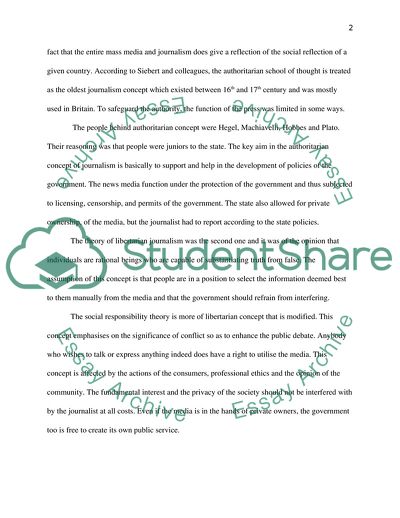Cite this document
(Objectivity in Professional Journalism Literature review Example | Topics and Well Written Essays - 3000 words - 1, n.d.)
Objectivity in Professional Journalism Literature review Example | Topics and Well Written Essays - 3000 words - 1. https://studentshare.org/journalism-communication/1871174-there-are-various-ways-in-which-professional-journalism-is-characterized-but-objectivity-is-crucial-to-many-of-these-discuss-in-relation-to-examples-of-print-or-broadcast-news-reporting
Objectivity in Professional Journalism Literature review Example | Topics and Well Written Essays - 3000 words - 1. https://studentshare.org/journalism-communication/1871174-there-are-various-ways-in-which-professional-journalism-is-characterized-but-objectivity-is-crucial-to-many-of-these-discuss-in-relation-to-examples-of-print-or-broadcast-news-reporting
(Objectivity in Professional Journalism Literature Review Example | Topics and Well Written Essays - 3000 Words - 1)
Objectivity in Professional Journalism Literature Review Example | Topics and Well Written Essays - 3000 Words - 1. https://studentshare.org/journalism-communication/1871174-there-are-various-ways-in-which-professional-journalism-is-characterized-but-objectivity-is-crucial-to-many-of-these-discuss-in-relation-to-examples-of-print-or-broadcast-news-reporting.
Objectivity in Professional Journalism Literature Review Example | Topics and Well Written Essays - 3000 Words - 1. https://studentshare.org/journalism-communication/1871174-there-are-various-ways-in-which-professional-journalism-is-characterized-but-objectivity-is-crucial-to-many-of-these-discuss-in-relation-to-examples-of-print-or-broadcast-news-reporting.
“Objectivity in Professional Journalism Literature Review Example | Topics and Well Written Essays - 3000 Words - 1”. https://studentshare.org/journalism-communication/1871174-there-are-various-ways-in-which-professional-journalism-is-characterized-but-objectivity-is-crucial-to-many-of-these-discuss-in-relation-to-examples-of-print-or-broadcast-news-reporting.


